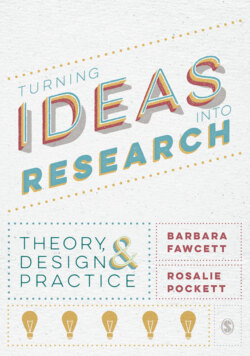Читать книгу Turning Ideas into Research - Barbara Fawcett - Страница 16
На сайте Литреса книга снята с продажи.
Exploring partnerships in research
ОглавлениеThe prospect of undertaking a piece of research from beginning to end is a daunting one – often so daunting in fact that many students and practitioners hesitate to pursue the development of good ideas into researchable projects. One manageable approach is to think about the research task through the lens of partnerships with others. Research partnerships occur when individuals come together in different ways to pursue research. This may include collaborations between researchers; relationships between researchers and all those engaged in the research process; and relationships between researchers and knowledge.
These three relationships will be explored in some detail, but they are by no means exclusive, as the research endeavour involves many fundamental relationships. In considering the initial engagement with research, Alston and Bowles (2012) and D’Cruz and Jones (2014: 13) suggest that the identification of ‘key players’, and the answers to some specific questions, contribute to the initial work that must be undertaken by researchers to build both the conceptual and critical foundations of the project. These questions are: who is/are the researcher/s; who are the people being researched; what organizations are involved; who will benefit from the research; and who will be influenced by the research? The answers to these questions will also identify key relationships that exist beforehand or will need to be developed to pursue the research and the implementation of any outcomes.
Partnerships between researchers can take many forms. They can range from a simple partnership or collaboration with a colleague interested in the same area of inquiry about an aspect of their work, to very formal, contractual partnerships that involve significant research funding to study an identified problem or situation. For workers who lack research experience or the confidence to undertake an individual project, partnerships provide opportunities to learn from others; to learn together; and to affirm practice knowledge in the interpretation of data and the suitability of research design. Ideally, partnerships or research collaborations provide opportunities for the strengths and experiences of individual members to be shared and utilized for the common research pursuit.
In considering research partnerships, educational researchers Anderson and Freebody (2014: 5) state:
when we use the term partnership research … we are referring to a partnership between a researcher and a research context, and the people who associate with that context. Although classically in education, partnership research occurs between researchers and teachers, it could also involve partnerships with schools, government departments, community education centres, outdoor education centres, businesses or any organization concerned with education.
The expression of research partnerships in these terms can be used in many other fields of practice, including the health and social care sectors, and is a foundational component of new and inclusive ways of thinking about research, research orientations and the generation of knowledge. We will turn now to some specific types of research partnerships.
